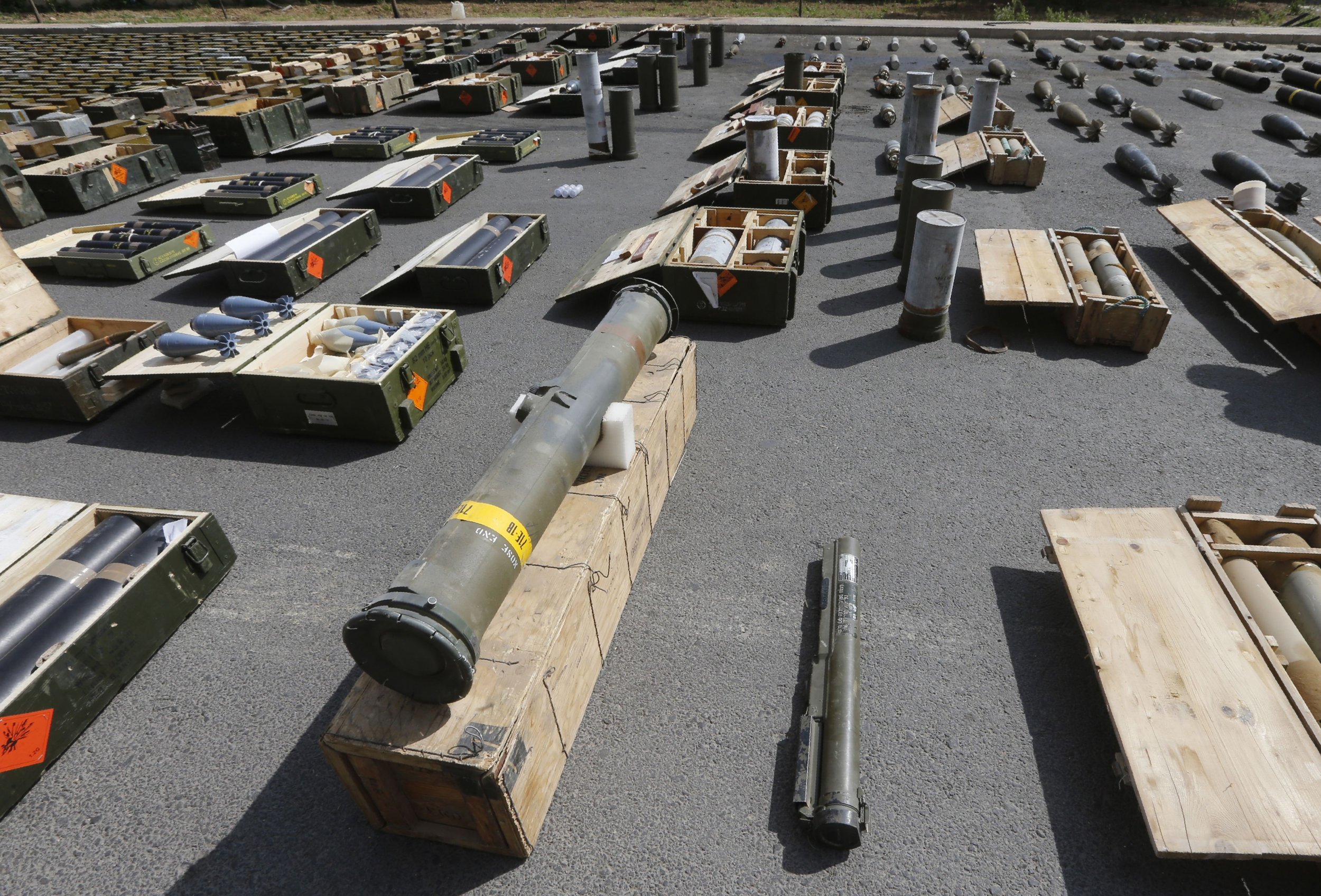
President Donald Trump has unsubscribed from a historic international agreement intended to limit the flow of weapons to potential human rights abusers, even though the United States has, for years, been accused of violating the treaty.
Trump announced Friday during a conference for the National Rifle Association that he would remove the U.S. signature from the Arms Trade Treaty (ATT). The controversial firearms advocacy organization and its lobbying arm, the Institute for Legislative Action (NRA-ILA) vehemently opposed the ATT when it was signed by former President Barack Obama in 2014.
Echoing conservative criticism of the treaty, the president vowed to "never surrender American sovereignty to anyone" nor to "allow foreign bureaucrats to trample on your Second Amendment freedom."
"That is why my administration will never ratify the U.N. Arms Trade Treaty," Trump said. "I hope you're happy."
The move was met with cheers among the audience, but widely criticized by human rights groups that saw the decision to withdraw from ATT as exacerbating the already unparalleled level of U.S. weapons sales around the world. As previous reports have indicated, some of these sales may already have violated the treaty.

The U.S., the world's No. 1 arms exporter, has long been deeply involved in conflicts across the globe. The country's efforts to overthrow foreign leaders and defeat other forces deemed adversarial to Washington's interests have sometimes led to the proliferation of weapons in the hands of groups charged with crimes against humanity. Such reports have surfaced from Latin America to Asia, and, especially in the Middle East throughout the 21st century.
The U.K.-based Conflict Armament Research issued a report in December 2017 finding that the U.S. and Saudi Arabia—the leading customer of U.S. arms—had violated the nontransfer clauses of the Arms Trade Treaty by diverting "large numbers" of arms and ammunition purchased from signatory states in Europe and secretly diverted to insurgents fighting to oust Syrian President Bashar al-Assad. The report specifically traced how much of this was ultimately acquired by the Islamic State militant group (ISIS).
The issue was so severe that legislators from the European Union's top legislative body, the European Parliament, said last year they were "shocked at the amount of EU-made weapons and ammunition found in the hands of Da'esh, in Syria and Iraq," using the Arabic-language acronym for ISIS.
The European Parliament called on members to adhere to rules set to prevent weapons from being re-directed and to "refuse similar transfer in the future, notably to the U.S. and Saudi Arabia."
The U.S. and Saudi Arabia have also been implicated in the ongoing conflict in Yemen. Trump recently vetoed a landmark congressional effort to block the Pentagon from supporting Riyadh in its war against a Zaidi Shiite Muslim group known as Ansar Allah, or the Houthis. U.S. munitions supplied to Saudi Arabia have been tied to attacks that killed civilians, and a CNN investigation released in February found multiple instances of U.S.-supplied mine-resistant armored vehicles and anti-tank guided missiles being passed on to Islamist militias backed by Saudi Arabia and its ally, the United Arab Emirates.

The U.S. accounted for roughly 36 percent of the world's arms sales between 2014 and 2018. Most of these weapons went to the Middle East, according to a report released in March by the Stockholm International Peace Research Institute. While it was unclear if dropping out of the Arms Trade Treaty would further inflate these figures, Amnesty International USA Deputy Director for Advocacy and Government Relations Adotei Akwei condemned Trump's announced move as "misguided blow to efforts to promote international peace and security" and challenged the president's reason for leaving the deal.
"The treaty requires governments to assess the risk of violations of international human rights and humanitarian law before they authorize an arms deal in order to prevent weapons from being irresponsibly used in brutal conflicts, by organized crime or funneled to terrorists," Akwei said in a statement sent to Newsweek. "It in no way interferes with the Second Amendment of the U.S. Constitution, which guarantees U.S. citizens the right to bear arms."
Fellow human rights group Oxfam International came to a similar conclusion, with the group's national president Abby Maxman calling Trump's decision "a reckless, self-inflicted wound that continues to demonstrate the Administration's desire to turn its back on global norms, standards and U.S. leadership" and "one more misguided step to dismantle the international partnerships that keep us all safe."
"It's no coincidence that this comes on the heels of President Trump's veto of the Yemen War Powers Resolution and continued military support for Saudi Arabia in the war in Yemen," Maxman said in a statement sent to Newsweek. "President Trump is sending a clear message to civilians caught in the crossfire: We don't care."
The ATT was ratified by 101 countries, including the entirety of the EU. An additional 34, including the U.S., have signed the treaty but not officially ratified the agreement. Among the dozens more world powers who neither signed nor ratified were China, India, Iran, North Korea, Saudi Arabia and Syria.
Uncommon Knowledge
Newsweek is committed to challenging conventional wisdom and finding connections in the search for common ground.
Newsweek is committed to challenging conventional wisdom and finding connections in the search for common ground.
About the writer
Based in his hometown of Staten Island, New York City, Tom O'Connor is an award-winning Senior Writer of Foreign Policy ... Read more
To read how Newsweek uses AI as a newsroom tool, Click here.





